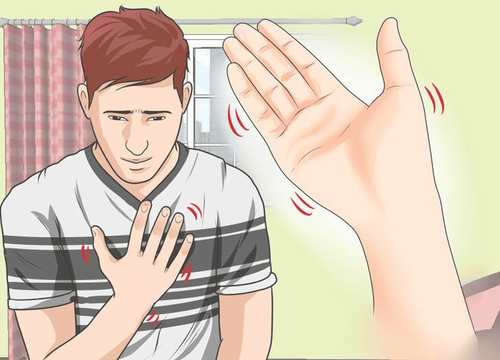This is an automatically translated article.
When you hear a sad song or a happy story from someone else, you may have similar feelings. Researchers call this phenomenon “emotional contagion” – when emotions from a certain person or event happen to affect those around them.
1. Why is there emotional contagion?
Recently, neuroscientists have come up with a possible explanation for the phenomenon of emotional contagion by the mirror neuron system.
The concept of "mirror neurons" was first announced when scientists studied the brain cells of macaques and discovered that certain neurons start to work when these monkeys Watch other monkeys do something.
Experts say that: the "mirror" neural system reflects behaviors beyond the physical, thereby explaining the phenomenon of human empathy with others.
2. How does emotional contagion happen?
Emotional contagion , according to the research of many experts, will go through 3 stages: Awareness, Feedback and Viral stages.
2.1 Awareness Stage First of all, in order for an emotion to spread to you, you need to recognize what it is through your body's signals.
However, it's not always possible to tell if someone is feeling angry or feeling happy, as emotional cues are often very subtle.
For example, if you hear someone tell a sad story but in a nonchalant and relaxed tone, you are also unlikely to be affected by this emotion. On the contrary, when a joke is told in a sarcastic, angry attitude, you will easily recognize this negativity and move on to stage two.
2.2 The Feedback Stage After recognizing an emotion from a story, a song, etc., you will begin to experience those emotions. According to Dr. Maury Joseph, a psychologist in Washington DC, said: sensitive or vulnerable people, especially patients with depression, will quickly go to this stage, because they are helpless. sensitive to negative emotions from everything around.
2.3 The Contagious Stage When an emotion is experienced from within yourself and lasts, it becomes your own emotion. Also at this point, you are officially contagious.

Lây lan cảm xúc có nhiều giai đoạn khác nhau
3. Is emotional contagion good or bad?
This phenomenon is useful when you are "infected" with the positive emotions, happiness or enthusiasm of others. The researchers also found that the subjects who were easy to "catch" positive emotions from others were often competent and sociable people, with a collective personality. Simply put, they easily feel happy and full of energy, less stressed when interacting with happy people for a long time.
This result was also found for players in team sports . A team that is upbeat, positive and in good spirits will spread these emotions to every player on the team. And this causes the energy of team members to increase, making them more inclined to play better.
Some studies also show indirect relationships of emotional contagion through social networks, which can also improve people's moods.
4. When is emotional contagion negative?
Of course, the phenomenon of emotional contagion can also happen in a negative way, causing significant stress and depression in life. This is especially powerful when it comes to contagion of negative emotions present in close relationships with you, such as marriage, partnership, family, friends, etc. For these relationships Any sadness, fear or anxiety can have a lasting impact on your overall mood and outlook on life.
Studies show that depression in a spouse often leads to the transmission of this disease to the other person. The same is true for roommates. In addition, children raised by parents with depression are also more likely to develop the disease. Other negative emotions such as feeling anger, anxiety, fear... also have the same effect.
More dangerously, emotional contagion does not only occur around close relationships, but can also spread to a wider range, even the whole society.
5. What are the consequences of negative emotional contagion?
The phenomenon of negative emotional contagion can also have negative consequences for the health and mental health of the person affected. Even if you are not the person who directly experienced the sadness, if the anger, fatigue, and suffering of others are constant, they also affect the nervous system, causing you to become irritable and sad. and sorrow.
According to reports, depression or anger from others can affect entire families, leading to marriage breakdown with significant stressors.

Lây lan cảm xúc tiêu cực có thể gây hậu quả xấu cho tình thần người bị lây lan
6. How does emotional contagion become positive?
Emotional contagion is a phenomenon that happens to anyone. However, depending on the sensitivity of each person, the effect of this phenomenon is more or less. Overall, if you don't want to be negatively affected by this phenomenon, turn it into a positive.
6.1 Immerse yourself in the things that make you happy If you keep your surroundings filled with joy, you are less likely to be affected by negative emotions. In case you often face stress at work, turn your office or desk into a happy place by:
Plant small trees or raise fish if the office allows. Place photos of pets, children, friends... at the workspace. You can listen to your favorite music while working. 6.2 Spreading joy around If you don't want to be influenced by others, become an influencer by always smiling, smiling. These actions both help you be more optimistic and spread energy to everyone around.
Besides, smiling also helps to improve mood and reduce stress effectively.
In general, when you feel angry or feel happy, everyone around will be affected more or less. This emotional contagion can be negative or positive depending on the type of emotion being conveyed. So, try to spread joy and energy around to prevent the influence of bad emotions.
Please dial HOTLINE for more information or register for an appointment HERE. Download MyVinmec app to make appointments faster and to manage your bookings easily.













